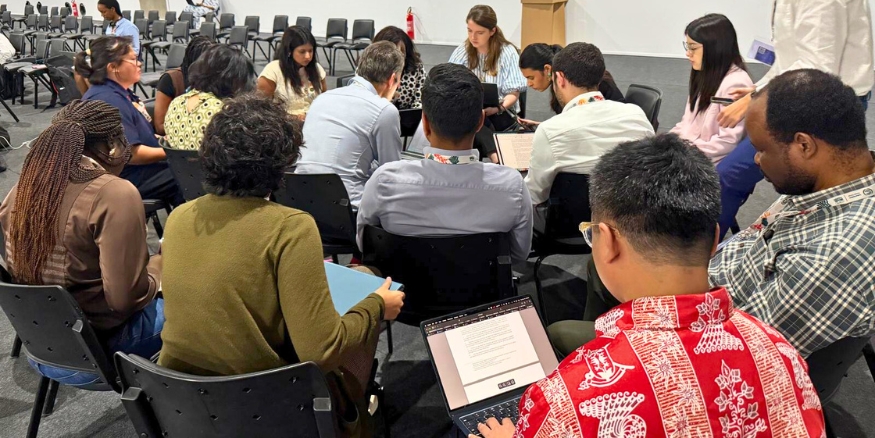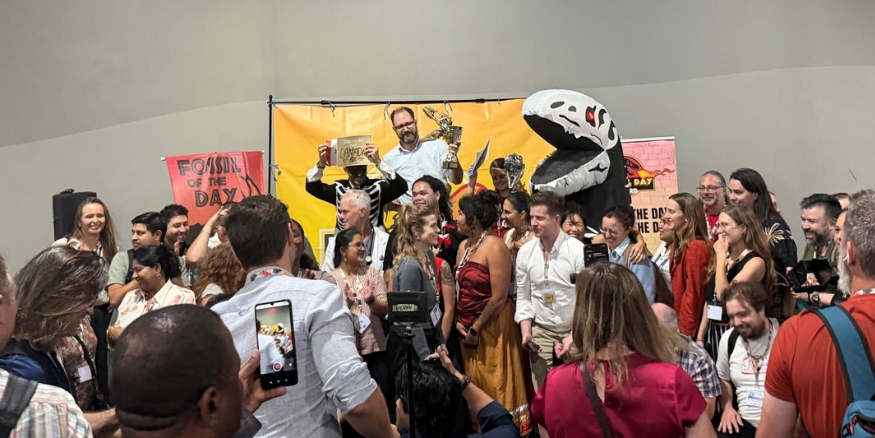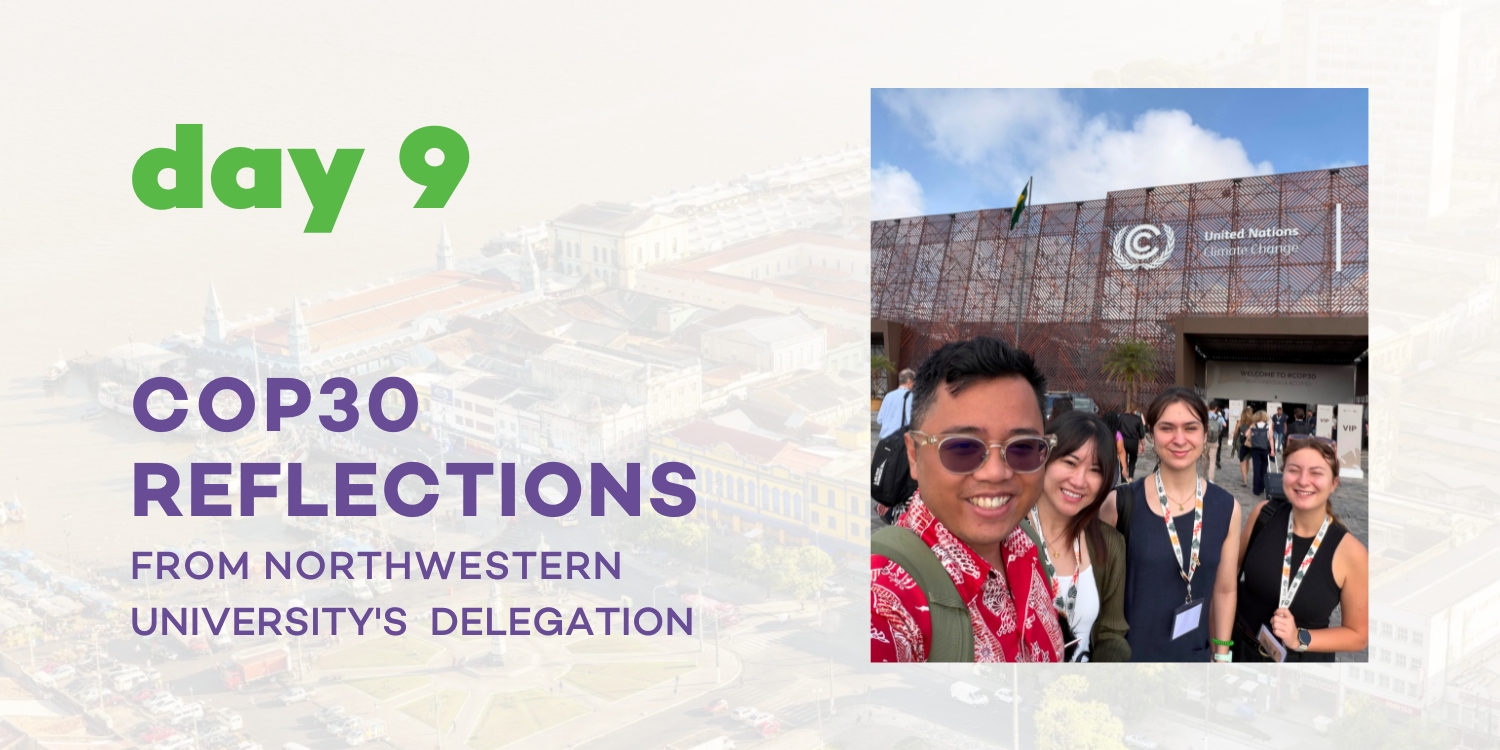Reflections from Northwestern University's COP30 Delegation: Day 9
For a fifth year, a delegation of Northwestern University students and faculty supported by the Roberta Buffett Institute is among more than 50,000 researchers, policymakers, industry leaders, and activists at the world’s largest annual international treaty negotiations and climate summit, the 30th Conference of Parties (COP30) to the United Nations Framework Convention on Climate Change (UNFCCC), held this year in Belém, Brazil. Each day, a different Northwestern delegate is blogging about their experiences and reflections. Day 9 features Bambang Trihadmojo, a PhD candidate in the Department of Sociology.
Inside the Negotiation Rooms
This week has been overwhelming in the best possible way. Although today is only my second full day attending COP30 in person, I have been following the conference virtually since day one. Being on the ground has given me a much deeper sense of how climate diplomacy actually works and how different actors shape the negotiations.
Before sharing my reflections, I want to express my gratitude to Northwestern University’s Roberta Buffett Institute for Global Affairs for facilitating my participation at COP30. I am also grateful to Indonesia’s UNFCCC National Focal Point for providing me with a party overflow badge that allows me to observe negotiations directly.
At COP30, I am following climate finance negotiations to understand how language reflects power in global climate politics. The wording of draft texts is not simply technical. Each phrase carries political weight and affects which responsibilities are highlighted and which are softened or obscured. Watching this dynamic unfold in real time has been fascinating.
My day began at the G77+China coordination meeting. While waiting for the meeting to begin, I made acquaintance with negotiators from Morocco, Honduras, AILAC, and AOSIS. Once the meeting started, the atmosphere immediately became serious. Member parties reflected on the previous day’s negotiations on climate finance and explored ways to move forward as a coalition while recognizing the different priorities within the group. Even before the negotiations began, it was clear that the G77+China carries the weight of representing a diverse range of developing countries whose needs are urgent and not always aligned.
Tracking the negotiations throughout the day was a challenge. Since November 17 I have been receiving frequent emails from the Climate Finance team announcing new or adjusted schedules. These changes often did not appear on the CCTV screens or on the official COP30 platform which made it difficult to keep up with the shifting agenda. Despite this, I managed to attend most of the sessions.

Bambang taking notes during one of the negotiations
Many of the discussions I attended turned out to be what negotiators call “Inf Inf.” This term refers to informal informals which are closed meetings that only party negotiators can join. Observers cannot enter. Because of this limited access, I can only offer a general impression of what took place. I followed negotiations on a range of agenda items from Article 9 paragraph 5 to the Global Climate Finance Report. Throughout these sessions, I also made acquaintances with negotiators from Panama, China, Japan, and Bhutan.
Across the meetings, one pattern stood out clearly. Climate finance negotiations are driven by intense discursive struggles. Parties debated the draft text paragraph by paragraph and line by line. A single phrase or even one verb could become the focus of disagreement. At times, one negotiating bloc pushed to delete an entire paragraph while another insisted that it remain. These clashes often brought the room close to a standstill. In several sessions, the discussions broke into smaller circles as parties tried to persuade one another in hopes of reaching a compromise on the language.
Between negotiations, I visited a number of pavilions. The first was the Indonesia Pavilion which hosted an event titled Sellers Meet Buyers. The goal was to promote carbon trading in Indonesia after the recent lifting of the moratorium. I found this event difficult to support because carbon trading in Indonesia raises environmental and cultural concerns that have not been fully addressed. After that, I went to the Saudi Arabia Pavilion to try their coffee which Professor Iza Ding had been recommending all week. It was enjoyable, but later I visited the Oman Pavilion and discovered that their coffee was even better. The staff welcomed me warmly with Omani sweets and generously gave me a small jar to bring home. Later in the afternoon, I met with the Director of the Coalition for Rainforest Nations as we had arranged earlier. We discussed the connection between finance and forests, focusing on sovereign carbon credits and how they are used to channel funding to national governments.
As I observed more climate finance negotiations, a clear pattern emerged that matched my impressions from the virtual sessions earlier in the week. The central tension revolves around the ideas of mobilization and access. Developed countries emphasize mobilizing financial resources and often highlight the role of private funding. Developing countries focus on access to predictable funding and the need for higher climate finance targets. In many rooms, developed countries concentrated on the technical language of the draft text. Developing countries repeatedly pushed for clarity on implementation and stronger commitments.
The Arab Group frequently highlighted Oman’s recent experience with the Green Climate Fund (GCF). Oman had submitted a proposal for a multi-hazard early warning system, but the project was rejected by several developed countries on the GCF board. This incident created visible anxiety among many developing country parties. The African Group expressed concern that what happened to Oman should not become a precedent, and several other blocs echoed the same worry. What stood out to me was how coordinated the developed countries appeared throughout the negotiations. For example, when the United Kingdom suggested removing or streamlining certain paragraphs in the draft text, the European Union, Australia, Canada, and Switzerland often supported the proposal. I suspect their coordinated position suggested a shared interest in resisting stronger obligations while presenting a unified strategic front.
These interactions raised deeper questions about how responsibility is negotiated in climate politics. From what I observed, developed country parties often rely on the technical language of negotiations as a way to obscure or minimize their obligations. Meanwhile, developing country parties often draw on narratives of vulnerability and loss to strengthen their claims for greater financial support and to assert what they view as their rightful entitlement. Both approaches reveal the asymmetry of power and resources that shapes the negotiation process.
To end on a lighter note, I discovered a few fun facts today. This is the first conference I have attended where my feet genuinely hurt. The venue is enormous, and I often found myself sprinting from one room to another. I also noticed that developed country negotiators tend to gather in small clusters after most sessions. I do not know what they discuss, but based on how coordinated their arguments were, I can imagine they were strategizing for the next round of talks. My day ended with a lively fossil fuel phaseout protest organized by the Climate Action Network (CAN). The demonstration featured a dancing dinosaur and the Jurassic Park theme song. It was also a social media competition. The winners were the European Union and Canada which led to a mix of cheers and playful boos from the crowd.

The fossil fuel protest organized by CAN
Today was exhausting but deeply rewarding. Observing the negotiations directly allowed me to see how climate politics is shaped not only by science and finance but also by language, power, and collective bargaining. It is messy and contentious, yet it is also filled with human connections and unexpected moments that make the experience meaningful.
 Bambang Trihadmojo is a PhD student in the Department of Sociology at Northwestern University whose work spans nature conservation, forest governance, and pro-environmental behavior. His current research investigates how linguistic choices shape perceptions of obligation and entitlement in climate negotiations. Drawing on cognitive sociology and political ecology, his dissertation develops a model to explain how vulnerable communities in Indonesia respond to recurring climate risks. He previously served as the Asia Pacific Regional Coordinator at The Climate Reality Project and worked as a consultant for the World Bank and the Center for International Forestry Research. Bambang holds an MA in Sociology from Northwestern University, an MSc in Social Psychology from Lancaster University, and a bachelor’s degree in psychology from the University of Muhammadiyah Malang.
Bambang Trihadmojo is a PhD student in the Department of Sociology at Northwestern University whose work spans nature conservation, forest governance, and pro-environmental behavior. His current research investigates how linguistic choices shape perceptions of obligation and entitlement in climate negotiations. Drawing on cognitive sociology and political ecology, his dissertation develops a model to explain how vulnerable communities in Indonesia respond to recurring climate risks. He previously served as the Asia Pacific Regional Coordinator at The Climate Reality Project and worked as a consultant for the World Bank and the Center for International Forestry Research. Bambang holds an MA in Sociology from Northwestern University, an MSc in Social Psychology from Lancaster University, and a bachelor’s degree in psychology from the University of Muhammadiyah Malang.

